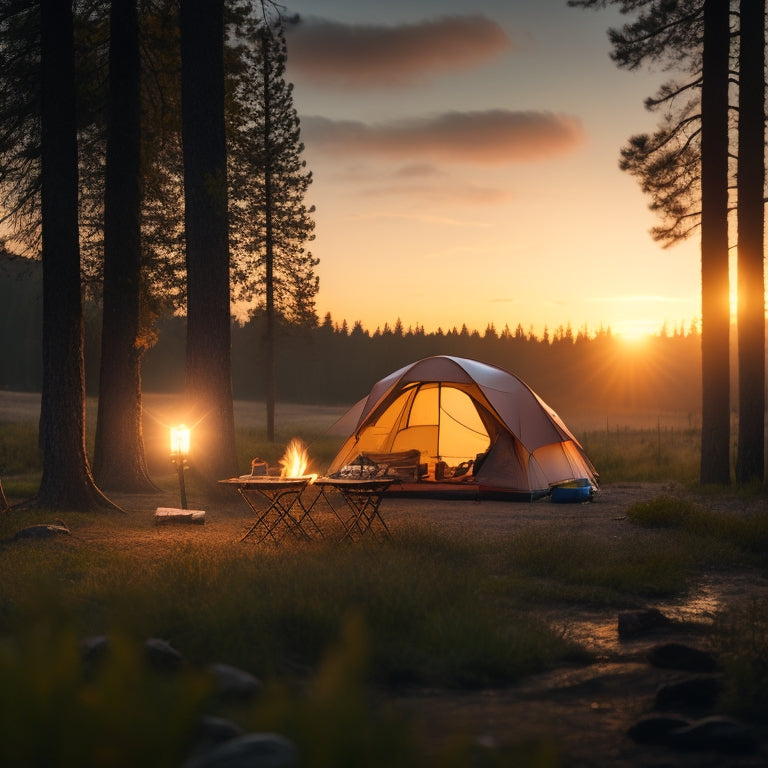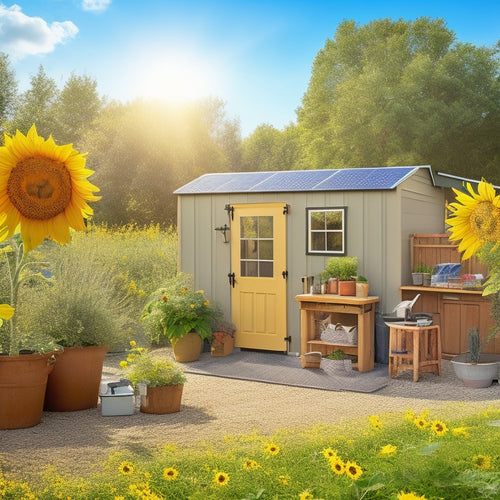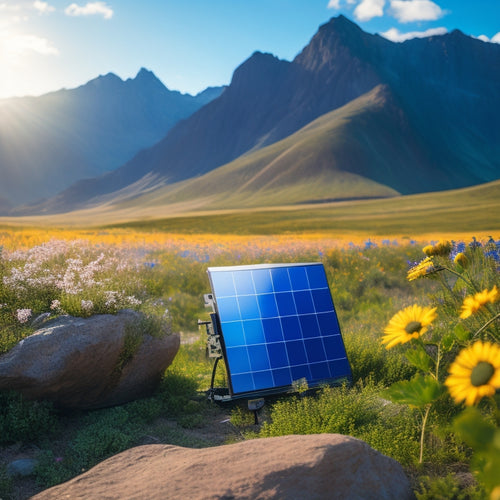
Top Solar Power Systems for Camping on the Go
Share
When you're camping on the go, portable solar power systems become essential for keeping your devices charged. Look for options like the SunPower 100W or Renogy 50W, both lightweight and efficient. Battery capacity, wattage output, and charging speed are critical factors to contemplate. Systems with USB ports and AC outlets enhance your versatility, allowing you to power everything from smartphones to portable fridges. Plus, these eco-friendly solutions guarantee you enjoy nature without harming it. Understanding the specifics can help you find the perfect fit for your excursions, making every trip more enjoyable and hassle-free. There's much more to investigate!
At a Glance
- Portable solar power systems should have a lightweight design for easy transport during camping trips.
- Ensure the system has sufficient wattage output to charge essential devices like smartphones and portable fridges.
- Look for systems with built-in battery packs to store energy for use during cloudy conditions.
- Choose solar panels with high efficiency ratings for optimal sunlight conversion and power generation.
- Regular maintenance and proper positioning of panels enhance energy capture and overall performance.
Portable Energy for Adventures
When you're heading out on an expedition, having portable energy can make all the difference. A 400Wh Lithium-Ion Battery provides high energy density and long cycle life, guaranteeing you have a reliable power source to keep your devices charged.
You'll want to take into account essential features like battery capacity and charging speed to make certain your devices stay powered up.
Plus, exploring the best portable options available can help you find the perfect fit for your camping needs.
Essential Features to Consider
Choosing the right solar power system for camping can change your outdoor experience, providing reliable energy for your devices and amenities. When evaluating your options, consider the solar panel's wattage output. Higher wattage means more power for your gadgets, so choose a system that meets your needs.
Next, think about charging device compatibility. Make sure the solar power system can charge all your essential devices, from smartphones to portable fridges. Look for systems with multiple output options, like USB ports and AC outlets, to maximize versatility.
Solar panel maintenance is another crucial factor. A system that's easy to clean and maintain will save you time and hassle on your excursions. Opt for models with durable materials and weather-resistant features, ensuring they stand up to the rigors of the great outdoors.
Lastly, portability is key. Look for lightweight, compact designs that you can easily carry or store in your vehicle.
With the right solar power system, you'll enjoy the freedom to investigate while keeping your devices charged and ready for use. Equip your journeys with reliable energy and stay connected wherever you roam!
Best Portable Options Available
For outdoor enthusiasts seeking reliable energy, portable solar power systems are revolutionaries. They offer the freedom to charge devices anywhere, from remote campsites to beach outings. A few top solar panel brands like Renogy and Jackery provide excellent options customized for your experiences.
When choosing a portable solar system, consider your power needs. If you're just charging a phone or a small speaker, a compact 50-watt panel might suffice. However, if you plan to run multiple devices or larger appliances, opt for a sturdy system that delivers higher wattage.
Many of these systems come equipped with built-in battery packs, ensuring you have stored energy for cloudy days.
Don't forget about versatility. Look for solar panels that can easily connect to various charging devices, from USB outputs to AC outlets. Some brands offer foldable designs that make transporting a breeze.
Ultimately, investing in a quality portable solar system means you can welcome your love for the outdoors without sacrificing your need for power.
Eco-Friendly Power Source
When you choose solar power for your camping trips, you're tapping into a sustainable energy source that benefits the planet.
Not only does it minimize your environmental impact, but it also allows you to enjoy the great outdoors without guilt.
Embracing solar energy means you can power your excursions while protecting nature at the same time.
Sustainable Energy Benefits
Camping with solar power systems offers a sustainable energy solution that aligns perfectly with eco-friendly principles. By utilizing renewable energy, you can enjoy off-grid living while reducing your carbon footprint. This not only benefits the environment but also gives you the freedom to discover nature without the constraints of traditional power sources.
When you choose solar power, you're tapping into an endless resource—the sun. Here's a quick overview of the benefits:
| Benefit | Description | Impact on Camping |
|---|---|---|
| Renewable Energy | Solar energy is sustainable and abundant. | Power anywhere, anytime. |
| Cost-Effective | Low long-term costs with minimal maintenance. | Save money on fuel and power. |
| Portability | Lightweight, easy to transport systems. | Freedom to camp in remote areas. |
| Energy Independence | No reliance on grid power or generators. | Enjoy nature without limits. |
With solar power, you can charge your devices, run lights, and power small appliances, all while staying true to your eco-friendly values. So, grab your solar setup and get ready for a camping experience that's both liberating and sustainable!
Minimal Environmental Impact
One of the standout features of solar power systems is their minimal environmental impact, making them an ideal choice for eco-conscious campers. By utilizing the sun's energy, you can power your excursions without contributing to pollution or depleting natural resources.
The solar panel materials used in these systems are often designed with sustainability in mind, reducing waste and promoting wildlife conservation. As you set up your campsite, you can rest easy knowing your energy source is clean and renewable.
Unlike traditional generators, solar power systems produce no harmful emissions, allowing you to enjoy the great outdoors without leaving a negative mark on the environment. You're also helping to protect local ecosystems, ensuring that wildlife can thrive without disturbances from noisy, fossil-fuel-powered equipment.
Additionally, solar power systems require minimal maintenance, meaning less hassle for you. You can focus on what truly matters: exploring nature and enjoying your freedom.
Key Specifications Overview
When choosing a solar power system for camping, understanding key specifications is crucial.
You'll want to evaluate power output capacity to guarantee you have enough energy for your needs, along with portability and weight for easy transport.
Systems like the Renogy 400W offer high-efficiency monocrystalline solar panels, which are ideal for off-grid power solutions.
Additionally, options such as the Jackery Explorer 500 provide a rugged design, making them perfect for outdoor excursions.
Let's break down these critical factors to help you make an informed decision.
Power Output Capacity
Often overlooked, the power output capacity of solar power systems for camping is crucial for ensuring you have enough energy for your devices. When choosing a system, pay close attention to the solar panel efficiency, which determines how effectively sunlight is converted into usable electricity. Higher efficiency means you'll gather more power in less time, giving you the freedom to enjoy your camping experience without worrying about running out of juice.
Battery storage options are another critical factor. They store the energy generated during the day, allowing you to access power even when the sun isn't shining. Look for systems with sufficient capacity to meet your needs, whether you're charging a smartphone, running lights, or powering a small fridge.
It's important to match your energy consumption with the system's output and storage capabilities, ensuring you're never left in the dark. Ultimately, understanding power output capacity will enable you to choose a solar system that fits your adventurous lifestyle.
You'll be ready to roam freely, knowing you have reliable energy at your fingertips. Accept the great outdoors with confidence, knowing your solar power system has your back!
Portability and Weight
Portability and weight are essential factors you'll want to take into account for your solar power system, especially if you're planning to hike or travel to remote camping sites. A system that's easy to carry and set up can make all the difference in your outdoor excursions. Look for models featuring compact designs and lightweight materials, as they guarantee you won't be bogged down by heavy gear.
Here's a quick comparison of some top portable solar power systems:
| Model | Weight (lbs) | Dimensions (inches) |
|---|---|---|
| SunPower 100W | 3.5 | 24 x 16 x 1 |
| Renogy 50W | 3.5 | 23.2 x 15.4 x 1.2 |
| Goal Zero 100W | 5.5 | 26 x 16 x 2 |
| Anker 21W | 1.5 | 11 x 6 x 1 |
| ALLPOWERS 18V 100W | 4.4 | 25 x 22 x 1 |
When you choose a solar power system, consider how its weight and portability align with your desire for freedom in the great outdoors. Happy camping!
Selecting Based on Power Output
When choosing a solar power system for camping, it's essential to understand your power needs first. Evaluating your daily energy usage will help you determine the necessary capacity for energy independence and guarantee you have the right battery type for your needs.
Consider what devices you'll be using and how much energy they require, then compare different solar panel types to find the best fit. This way, you'll make sure you have enough power to keep your gear running smoothly while enjoying the great outdoors.
Additionally, exploring options like lithium-ion batteries can provide superior performance and longevity for your camping excursions.
Understanding Power Needs
Before you head out into the great outdoors, comprehending your power needs is vital for a successful camping trip. You want to guarantee you've got the right solar power system to meet your energy demands without leaving you in the dark. Start by evaluating your power consumption for the devices you plan to use.
Check out this handy table to help you get a clearer view of what you might need:
| Device | Wattage | Usage Time (hrs) |
|---|---|---|
| Smartphone | 10W | 4 |
| LED Lantern | 5W | 6 |
| Portable Fridge | 50W | 8 |
| Laptop | 60W | 5 |
To calculate your total daily power consumption, multiply the wattage of each device by its usage time and sum them up. This will give you an idea of how many watts you'll need from your solar setup. By understanding your power needs, you'll have the freedom to enjoy your camping experience without worrying about running out of juice!
Comparing Solar Panel Types
Now that you've evaluated your power needs, it's time to explore the different types of solar panels available for camping. When selecting, you'll want to concentrate on solar panel efficiency and durability to guarantee you get the most out of your investment.
Monocrystalline panels are known for their high efficiency, converting more sunlight into electricity. They're ideal if you're limited on space but want maximum power output.
Polycrystalline panels, while slightly less efficient, are often more affordable and still provide solid performance for your camping trips.
If you're looking for something lightweight and portable, consider flexible solar panels. They may not match the efficiency of the others, but their durability and convenience make them great for on-the-go excursions.
Always check the warranty and construction materials, as a durable panel will withstand the elements and last longer, giving you peace of mind on your travels.
Ultimately, the right choice depends on your specific needs and how much power you want to utilize. Welcome the freedom of the outdoors, and choose a solar panel system that fits your style!
Higher Energy Efficiency Ratings
When you're out camping, maximizing your solar output is essential for keeping your devices charged.
Higher energy efficiency ratings in solar panels mean more power from the same amount of sunlight, allowing you to get the most out of your setup.
Maximizing Solar Output
While you're out camping, maximizing solar output is crucial for guaranteeing your devices stay charged and your experience remains comfortable. To achieve this, focus on enhancing sunlight exposure and performing regular solar panel maintenance. Here's a quick checklist to help you get the most from your solar setup:
| Action | Benefits |
|---|---|
| Position Panels Correctly | Guarantees maximum sunlight absorption |
| Clean Panels Regularly | Increases efficiency by reducing dirt |
| Track Sun Movements | Adjust panel angles for peak sunlight |
By positioning your solar panels in a spot that captures the most sunlight—ideally facing south—you'll boost their efficiency. Don't forget to clean your panels regularly; dirt and debris can drastically reduce their output. Tracking the sun's movement throughout the day also allows you to adjust the angle of your panels for peak performance.
With these strategies, you'll utilize the freedom of solar power, guaranteeing your devices are always ready, whether you're in the woods or by the lake. Accept the outdoors without sacrificing comfort, and let the sun work for you!
Frequently Asked Questions
How Do I Maintain My Solar Power System While Camping?
To maintain your solar power system while camping, regularly check battery health and perform necessary maintenance. Clean your panels to maximize efficiency, ensuring you enjoy reliable power and the freedom to investigate without worry.
Can I Use Solar Power Systems in Cloudy Weather?
Yes, you can use solar power systems in cloudy weather, but solar efficiency decreases. While weather impacts energy production, your system can still gather sunlight, providing a reliable source of power during your excursions.
What Are the Best Practices for Storing Solar Panels?
To store solar panels effectively, guarantee proper panel placement away from direct sunlight when not in use. Also, keep battery storage in a cool, dry place to maintain performance and extend lifespan. You'll enjoy hassle-free energy!
How Long Does It Take to Charge Devices With Solar Power?
Charging devices with solar power can feel like waiting for a flower to bloom. Depending on solar charging efficiency and your device power requirements, it usually takes a few hours to several hours for a full charge.
Are Solar Power Systems Safe to Use Indoors?
Yes, solar power systems can be safe to use indoors if you follow guidelines. Guarantee proper ventilation and check for indoor safety standards. With good solar efficiency, you can enjoy clean energy without worry.
Explore More
In the great outdoors, having the right solar power system is like carrying a slice of the sun with you. These portable energy solutions not only keep your devices charged but also support your eco-conscious journeys. By considering power output and efficiency, you can find the perfect fit for your needs. So, gear up, soak in those rays, and let the sun fuel your next camping escapade—because every expedition deserves a bright spark of energy!
Related Posts
-

How to Achieve a Zero-Waste Lifestyle for a Greener Tomorrow
To achieve a zero-waste lifestyle, start by adopting the principles of refusing, reducing, reusing, and recycling. Sw...
-

Building an Emergency Backup Solar Power System in 5 Essential Steps
Building an emergency backup solar power system involves five key steps. First, assess your daily energy needs to ide...
-

High-Efficiency Solar Battery Chargers for Remote Areas
High-efficiency solar battery chargers are essential for your off-grid energy needs in remote areas. They maximize en...


